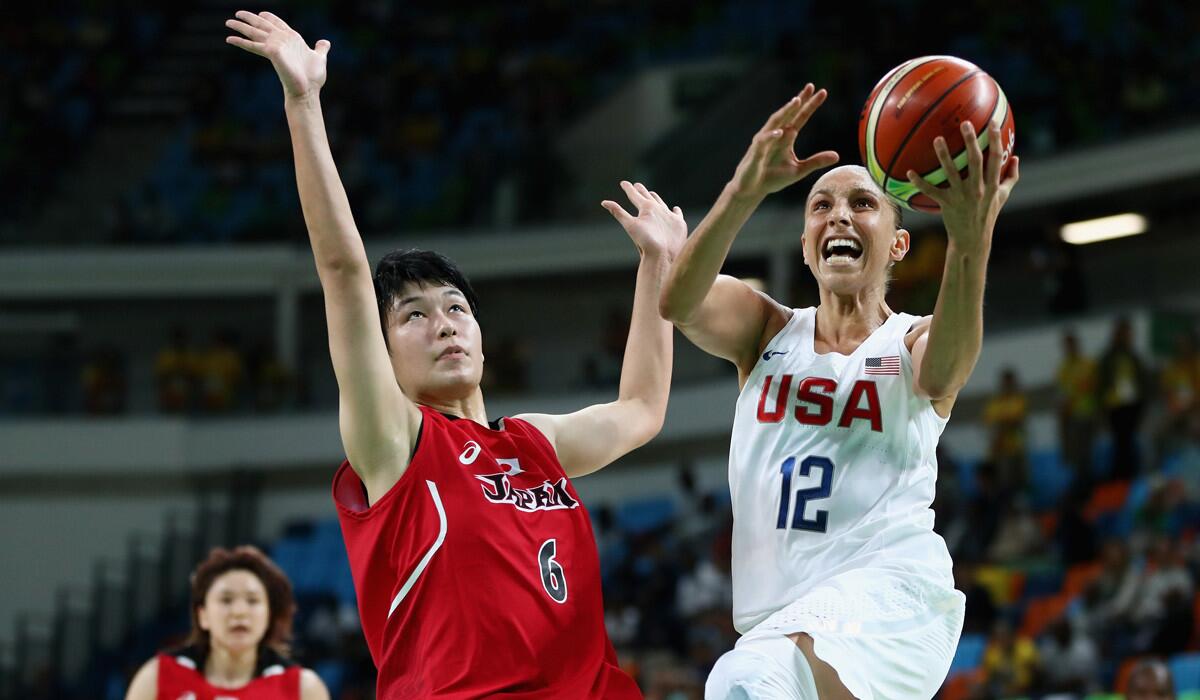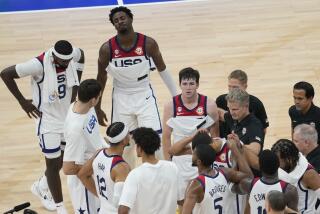You wouldn’t know U.S. women’s team struggled, considering 110-64 victory over Japan

It might not be evident from the final score, a 110-64 victory Tuesday by the U.S. women’s basketball team, but there were nervous moments in the quarterfinal game.
Japan’s up-tempo style and proficiency behind the three-point arc gave the U.S. fits in the first half -- so much so that the underdogs were within two late in the second quarter.
But the American offense was just too hard to contain. Once the U.S. made an adjustment – switching on screens instead of fighting through them – Japan was helpless to stop it. The lead was 10 by halftime, then 22 by the end of the third quarter.
Through six games, the U.S. offense has looked like a model for the rest of the world. There is no discernible weakness and it strikes with lethal, swift efficiency. On Tuesday the U.S. shot 65% overall and 61% (11 for 18) from three-point range.
“Everybody says it seems like it’s easy,” center Sylvia Fowles said. “It’s really not.”
It was hard to take her seriously, though Tuesday’s win could be costly because point guard Sue Bird injured her right knee in the second quarter, and missed most of the rest of the game. Bird’s availability for the semifinal Thursday is unknown.
The offense barely missed a beat. It speaks to the depth of talent and skill the U.S. has. Seven players scored in double figures, led by Maya Moore and Diana Taurasi with 19 each. Elena Delle Donne scored 15.
“A lot of times you can’t really go into tournaments like this and really get the most out of everyone,” Taurasi said. “It’s just hard, but we found a way to get the most out of every single person on this team. … There’s a lot of synergy between this team and I think that comes from being unselfish.”
So unselfish that Coach Geno Auriemma said he can’t threaten players with cutting their playing time.
“The beauty of coaching 12 elite offensive players is … what are you going to say to these guys? I’m going to bench you if you don’t do this?” Auriemma said. “That’s not going to happen. How many and the quality of your minutes is generally going to depend on how committed you are to the defensive end. You’re not going to be able to shoot your way into anything.”
Auriemma is convinced, even after six dominant offensive performances, that the U.S. has not hit its ceiling. The team has played together less than a month and the jelling process hasn’t completed.
“We didn’t spend a lot of time together,” Auriemma said. “There’s no chance that we peak too soon. … Everything’s fresh and moving in the right direction.”
It’s hard to fathom how much better the U.S. could look like if it gets to its desired destination.
Twitter @ChristopherHine
More to Read
Go beyond the scoreboard
Get the latest on L.A.'s teams in the daily Sports Report newsletter.
You may occasionally receive promotional content from the Los Angeles Times.






